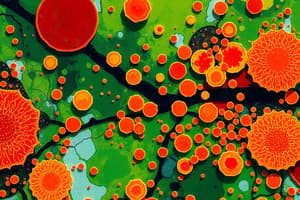Podcast
Questions and Answers
What is environmental microbiology?
What is environmental microbiology?
Environmental microbiology is the scientific study of microorganisms in various environments, such as air, water, and soil.
What types of microorganisms are studied in environmental microbiology?
What types of microorganisms are studied in environmental microbiology?
Bacteria, fungi, and viruses are studied in environmental microbiology.
What are the key aspects of environmental microbiology?
What are the key aspects of environmental microbiology?
The key aspects include understanding the distribution, abundance, and activity of microorganisms in different environments, as well as their interactions with other organisms and abiotic factors.
What are some applications of environmental microbiology?
What are some applications of environmental microbiology?
What is the importance of studying environmental microbiology?
What is the importance of studying environmental microbiology?
What are some of the current challenges in environmental microbiology research?
What are some of the current challenges in environmental microbiology research?
How do microplastics impact soil fungal communities?
How do microplastics impact soil fungal communities?
What role does environmental microbiology play in addressing antibiotic resistance?
What role does environmental microbiology play in addressing antibiotic resistance?
How is climate change affecting microorganisms in different environments?
How is climate change affecting microorganisms in different environments?
What are the implications of environmental microbiology for understanding ecosystems and human societies?
What are the implications of environmental microbiology for understanding ecosystems and human societies?
Study Notes
Environmental Microbiology: The Study of Microorganisms in the Environment
Environmental microbiology is the scientific study of microorganisms in various environments, such as air, water, and soil. This interdisciplinary field examines the interactions between microorganisms and their surroundings, focusing on the impact of these microbes on ecosystems and human societies. In this article, we will explore the key aspects of environmental microbiology, its importance, and its applications.
Important Microorganisms in Environmental Microbiology
Environmental microbiology deals with a diverse range of microorganisms, including bacteria, fungi, and viruses. These microbes play crucial roles in maintaining ecosystem balance, cycling nutrients, and providing essential ecological services. The study of environmental microbiology aims to understand the distribution, abundance, and activity of these microorganisms in different environments and their interactions with other organisms and abiotic factors.
Environmental Microbiology: Applications and Challenges
Environmental microbiology has various applications in different fields, such as soil, aquatic, and aeromicrobiology, as well as bioremediation and water quality. By understanding the behavior of microorganisms in the environment, researchers can develop strategies to improve environmental quality, protect human health, and promote sustainable development. Some of the current challenges in environmental microbiology research include:
-
Microplastic Pollution: Microplastics are a growing concern in the environment, and their impact on soil fungal communities can lead to changes in ecosystem functions. Researchers are investigating the effects of microplastics on microbial communities and their potential consequences for ecosystem health.
-
Climate Change: Climate change is affecting the distribution and abundance of microorganisms in different environments, leading to shifts in ecosystem dynamics and services. Environmental microbiologists are working to understand how microorganisms respond to changing environmental conditions and how they can be used as indicators of climate change.
-
Antibiotic Resistance: The rise of antibiotic resistance is a significant global health concern, and environmental microbiology plays a crucial role in understanding the spread and persistence of antibiotic-resistant microorganisms. Researchers are investigating the mechanisms behind antibiotic resistance and developing strategies to prevent its spread in the environment.
Conclusion
Environmental microbiology is a vibrant and interdisciplinary field that has significant implications for our understanding of ecosystems and human societies. By studying the distribution and behavior of microorganisms in the environment, researchers can develop innovative solutions to address environmental challenges and promote sustainable development. As the field continues to evolve, environmental microbiologists will undoubtedly face new challenges and opportunities for discovery, making it an exciting area of research for the future.
Studying That Suits You
Use AI to generate personalized quizzes and flashcards to suit your learning preferences.
Description
Explore the study of microorganisms in various environments and their impact on ecosystems and human societies. Learn about the important microorganisms, applications, and challenges in environmental microbiology.




